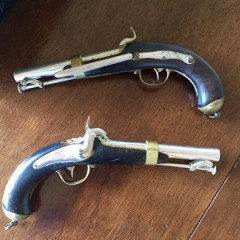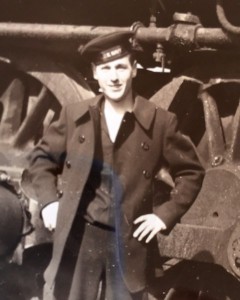A Remembrance of War

Today, Becky Allender reflects on her father, the stories we tell, and icons of war. This post originally appeared on Red Tent Living.
I have two French dueling guns that I set out each Memorial Day and on July Fourth as a reminder of the high cost of freedom. It is an odd seasonal decoration. It is especially odd since I don’t like guns and we don’t have any in our home. The guns were taken from an Italian museum, after armistice had been declared, as my father hitchhiked from his minesweeper to find a larger boat to return to America.
 An icon is a physical metaphor of a story that is not to be forgotten.
An icon is a physical metaphor of a story that is not to be forgotten.
As I took the guns out this year I asked myself a question that I have never addressed: Of all my father’s possessions, why did I take these?
My father was first stationed on a destroyer in the Atlantic and then, with special sonar training, he spent the rest of his naval service on minesweepers. He was part of five invasions in North Africa and the Mediterranean. He, along with most fathers I knew when I was growing up, never talked about the war. By the time I was born in the early ‘50s, our country had moved on to prosperity, and their trauma had been neatly boxed up and shelved. There were a couple of G-rated bedtime stories my dad would tell when putting me to bed. The one I remember best is of his ship being bombed and how he saved the radio by jumping off the boat with his arms high in the air to keep it from being destroyed. Beyond that, movies like McHale’s Navy and television shows like Hogan’s Heroes were my childhood understanding of World War II.
It was odd to come of age at the time of 2001: A Space Odyssey, the Kent State killings, SDS (Students for Democratic Society), and “The Pill.” My father was angry at my generation’s disdain for war. I was on a different side in this cultural conflict, and it put my father and I at odds. I was no longer aligned with him and I lost an important ally.
 I married soon after college, and our discussions never returned to war until I returned home the summer before my dad died. He walked into the kitchen and exclaimed, “Hey, Beck, I’ve got something to show you. Look at this, it’s my diary I kept during the war.” I had never heard of it before and was intrigued when he told me that it was illegal to have had a diary during the war. He talked about how he had to keep it hidden and had to write secretly. He then said that when the war ended his diary was carried home to the U.S. by a friend and then mailed to his dad in Columbus, Ohio, with strict instructions to not show it to anyone. Sure enough, that is exactly what was written on the sixty-year-old note to his dad on the first page. We sat down for what seemed to be just a few minutes together before my kids wanted to go to a water park with their cousins. As quick visits go, time gets away. We never sat down to read it again.
I married soon after college, and our discussions never returned to war until I returned home the summer before my dad died. He walked into the kitchen and exclaimed, “Hey, Beck, I’ve got something to show you. Look at this, it’s my diary I kept during the war.” I had never heard of it before and was intrigued when he told me that it was illegal to have had a diary during the war. He talked about how he had to keep it hidden and had to write secretly. He then said that when the war ended his diary was carried home to the U.S. by a friend and then mailed to his dad in Columbus, Ohio, with strict instructions to not show it to anyone. Sure enough, that is exactly what was written on the sixty-year-old note to his dad on the first page. We sat down for what seemed to be just a few minutes together before my kids wanted to go to a water park with their cousins. As quick visits go, time gets away. We never sat down to read it again.
A few years back, I went home to help clear out my parents’ home so we could sell it. Since they had been children during the Great Depression, many things had carefully been saved. My heart skipped a beat when I opened a drawer and found my dad’s diary. This time I had “extravagant time” to read my father’s reflections in his beautiful cursive. Each page seemed to be in technicolor, and the bombs that streaked the sky lit up like fireworks and booms that pierced my ears as I read his description of maritime battles. I had no idea that a young twenty year-old could enable me to smell the sulfur and hear the screams of young men jumping off minesweepers to their deaths. Page after page became a treasure hunt to his heart.
What I now know of trauma, after doing a course called Trauma and Abuse through The Allender Center, is that unresolved trauma resurfaces. My father would sometimes rage. He was sometimes extremely opinionated and seldom tolerated any opposing view. As much as I loved him, I knew he could quickly be at war with me. I now know that his hair-trigger anger was likely connected to things no young man ought to ever observe—let alone experience.
I don’t know why my father took the guns. When the war ended, many soldiers were told to get home however they could. My father mentioned hitchhiking through Italy to France and then getting a ride on a ship back to the U.S. He told of a bombed museum in Italy and how he grabbed two guns and put them in his duffel. These guns were never displayed in our home when I was growing up. They stayed in the back of a shelf in our family room. When I chose what to keep from my parents’ home, the guns were part of my booty.
With Memorial Day approaching I realized that these guns, which I thought conveyed a picture of freedom, hold much more than that. They are the prize of a young man who survived and needed an icon to remember the terror, death, and victory of his five years of hell. They were proof that he had lived through what he did and made it home alive.
I will hold and display those guns until I die because I don’t want my father’s sacrifice or suffering forgotten—nor his resolve and stealth to take those icons. He fought and suffered and as a warrior in a spiritual realm, I do too. I not only need a reminder of his service, I need one of mine as well.
My father is with Jesus. He knows far more than I do now that the war is not over and the cost is still as high as it was during his fight. Every time I display those guns I stand against all powers of darkness that wish to take life, and I proclaim instead that it is my privilege to live well and to remember.
